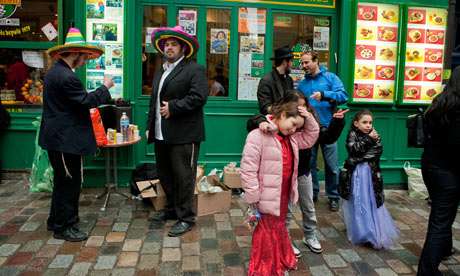 |
| "Orthodox Jews in the Marais district of Paris where John Galliano allegedly made his comments." (Alamy) |
By Kim Willsher
The Observer, March 6, 2011
"Like most Paris schools, the Ecole des Hospitalières-Saint-Gervais bears a sombre plaque. It reads: '165 Jewish children from this school, deported to Germany during the second world war, were exterminated in the Nazi camps. Do not forget.' In this district, known as the Marais, the heart of Paris's oldest Jewish quarter, gay bars rub shoulders with falafel cafés, kosher restaurants, synagogues and prayer rooms. Its labyrinthine streets have been home to Jews on and off since the 13th century. Ten days ago, however, it also played host to John Galliano. The alleged infamous outburst of the Dior designer, who has now been sacked, in which he is said to have abused a Jewish woman and her Asian boyfriend, was offensive on many levels -- not only because of what he allegedly said, but because of where he said it. It was in a bar just a few paces from the Hospitalières-Saint-Gervais that the couturier, who is British but has lived in the French capital for two decades, was arrested. And it was also where, last year, he was filmed telling two women he believed to be Jewish that he loved Hitler. His reported behaviour has shocked France and the fashion world. Yet in what locals call the pletzl -- "little place" in Yiddish -- it provoked little surprise. Local residents and traders say that the insult 'sale juif' (dirty Jew) is a fact of daily life; asking a local if they have suffered abuse provokes a quizzical stare as if you are trying to be funny. 'Bien sûr' ('of course') is the most common reply. 'It's stating the obvious,' says one kippah-wearing youngster in the Rue des Rosiers, the Jewish quarter's main street. 'We hear what Galliano said, or versions of it, every day, sometimes several times every day.' Like many I speak to, he prefers not to be named. Standing in the doorway of a grocery shop, Dan points to his wide-brimmed black hat. 'My 80-year-old neighbour told me that when she was growing up they used to say we Jews wore these hats to hide our horns, and long black coats to hide our tails,' he says, laughing. 'She would tell me not to let my boys wear their [skull] caps in case "they" come back. More than 50 years after the war, she still thought it could happen again.'
At the Sacha Finkelsztajn pastry shop, famous for its apple strudel and cheesecake, two women shrug when Galliano's alleged antisemitic diatribe is mentioned. Over the road in the Panzer, a grocery store, the shop assistant refuses to talk about Galliano. 'We're always being called "dirty Jews"; there's always been antisemitism here and there always will be. It upsets me, but it doesn't shock me.' ... In La Perle, the trendy bar where the designer -- who denies being antisemitic -- was arrested after another alleged outburst, Jérôme says: 'France invented the term "antisemitism".' ... Like a sore that never completely heals, antisemitism erupts in France, which has the biggest Jewish community in Europe, with depressing regularity. Toni Kamins, the American author of The Complete Jewish Guide to France, observes that since Roman times Jews have been subject to vilification and humiliation. It is a history scarred with mass expulsions, forced conversions to Christianity, crippling taxation, segregation and 'both systematic and random physical violence and murder'. [...]"














Unfortunately Ms. Willsher's reference to my work is used outside its original context. It does not refer to the current situation in France.
ReplyDeleteToni Kamins